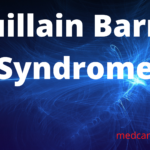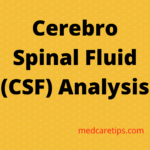Guillain Barre syndrome (GBS) is a rare neurological disorder in which the body’s immune system attacks the peripheral nerves. Peripheral nerves are a network of nerves present in the peripheral nervous system. The peripheral nervous system refers to parts of the nervous system outside the brain and spinal cord. It includes the cranial nerves, spinal […]
Nervous System
Cerebro Spinal Fluid Analysis
Cerebro spinal fluid (CSF) is a clear, colorless fluid that is found in the brain and spinal cord. Cerebro spinal fluid analysis is a series of tests performed on the CSF to diagnose diseases or conditions affecting the brain and spinal cord. In a normal person, the composition of CSF remains constant. However, in various […]
Lumbar Puncture or Spinal Tap-Indications, Procedure and Complications
Lumbar puncture is a medical procedure in which a thin needle is inserted into the spinal canal to collect cerebrospinal fluid (CSF). It is called ‘lumbar puncture’ because the needle is inserted in the lumbar portion of the back and used to puncture the tissues to enter the spinal canal. The CSF thus collected is […]
Migraine – Symptoms, Causes, and Treatment
A migraine is a neurological condition that can cause a moderate or severe headache. It is felt as throbbing pain, usually on one side of the head. It may be accompanied by nausea, vomiting, and extreme sensitivity to light and sound. A migraine attack can last for hours to days. The pain can be so […]
Cerebral Edema: Causes, Symptoms and Treatment
Cerebral edema is a life-threatening condition where there is an increase in fluid in the brain tissue. Swelling or edema is part of inflammation. It is a natural response of the body to injury and can happen anywhere. But when it happens in the brain, it poses a unique situation. Being enclosed in the skull, […]
Vagus Nerve Stimulation- Indications and Risks
Vagus nerve stimulation is a medical procedure that delivers electrical impulses to the vagus nerve. Currently, it is used for some types of intractable epilepsy and depression that does not respond to the treatment. Some countries also allow its use for the treatment of chronic pain. The vagus nerve is the tenth cranial nerve and […]
Periodic Paralysis – Types, Presentation and Treatment
Periodic paralysis or rather paralyses is a heterogeneous group of muscle diseases known as is characterized by recurrent episodes of flaccid muscle. Most of these conditions are hereditary. [amazon_link asins=’B00BSZBEAG’ template=’ProductCarousel’ store=’bas0ba-20′ marketplace=’US’ link_id=”] Types of Periodic Paralysis Periodic paralysis can be divided conveniently into primary and secondary disorders. Primary Periodic Paralysis Primary periodic paralysis […]
Central Pontine Myelinolysis
Central pontine myelinolysis is a concentrated, frequently symmetric, noninflammatory demyelination within the central Basilar part of pons. In at least 10% of patients with central pontine myelinolysis, demyelination also occurs in extrapontine regions, including the mid brain, thalamus, basal nuclei, and cerebellum. The exact mechanism that strips the myelin sheath is unknown though the proposed […]
Syndrome of Inappropriate Antidiuretic Hormone Secretion
The syndrome of inappropriate antidiuretic hormone secretion is defined by the hyponatremia, hypo-osmolality of plasma and increases osmolality of urine that results from inappropriate, continued secretion and/or action of antidiuretic hormone despite normal or increased plasma volume. Hyponatremia is defined as plasma Na+ concentration of less than 135 mEq/L. Syndrome of inappropriate antidiuretic hormone secretion […]
Glossopharyngeal Neuralgia
Glossopharyngeal neuralgia is the pain in the distribution of glossopharyngeal nerve distribution and causes repeated episodes of severe pain in the tongue, throat, ear, and tonsils, which can last from a few seconds to a few minutes. It us also called cranial mononeuropathy IX or Weisenberg syndrome. The ninth cranial nerve arising from brain stem leaves […]










